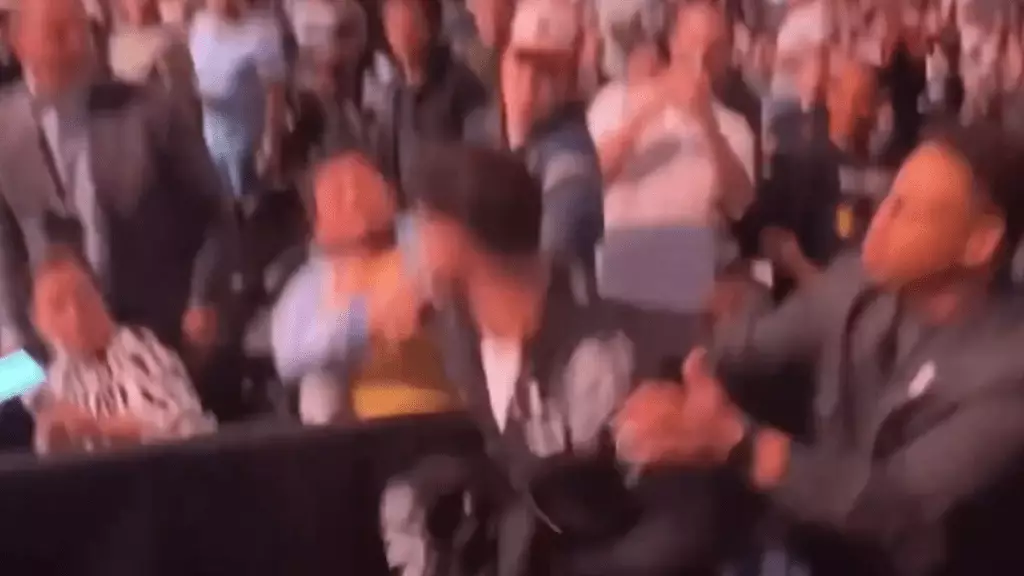The world of mixed martial arts (MMA) is often accompanied by drama, both inside and outside the octagon. At UFC 310, an incident involving bantamweight champion Merab Dvalishvili and his teammate Dennis Buzukja captured significant attention. The fracas that unfolded following Aljamain Sterling’s loss ignited discussions not just about sportsmanship but also about the impact of external provocations during high-stakes events. This article delves into the details of the altercation, examines both fighters’ perspectives, and reflects on the wider implications within the UFC ecosystem.
At UFC 310, tensions ran high as Aljamain Sterling faced defeat at the hands of Movsar Evloev—a situation that always carries emotional weight for fighters and their teams. Dvalishvili and Buzukja were present in Sterling’s corner, and as they made their way back to the locker room, an altercation erupted involving a fan named Arman Tugaev. This moment, initially captured by cellphone footage, showed Dvalishvili being held back by security while Buzukja engaged in a confrontation, throwing punches at Tugaev.
However, the circumstances leading up to this clash are far more complicated. According to Buzukja’s recounting on a podcast, the situation escalated when Tugaev supposedly instigated Dvalishvili by grabbing his arm and insulting him. This was not just a random encounter; there are allegations that Tugaev may have been acting on behalf of a rival camp, specifically Umar Nurmagomedov, which raises questions about premeditated provocations in the heated arena of MMA.
Merab Dvalishvili, the bantamweight champion in question, alluded to a deeper conspiratorial undertow when presenting his narrative of the event on social media. He suggested that Tugaev’s actions were not just happenstance but potentially orchestrated by team Nurmagomedov to unsettle him. This belief exposes an important aspect of combat sports: the intricate web of rivalries and the personal stakes that often transcend the physical competition.
By sharing an edited video that offered another angle of the confrontation, Dvalishvili contributed to the narrative of an externally triggered chaos—a story compelling enough to draw in fans and analysts alike. His assertion about Tugaev’s affiliations not only lends credence to his response but also highlights a growing skepticism regarding the integrity and authenticity of fan interactions at major events.
On the surface, it seems that Dennis Buzukja’s intention was to mediate rather than escalate the conflict. In his own words, he described an attempt to de-escalate the altercation by telling Tugaev to “calm down.” This attempt, however, quickly deteriorated when Tugaev allegedly struck him first, provoking a physical reaction. Buzukja expressed a sense of relief that the situation didn’t spiral out of control, appreciating that both parties only exchanged a few blows rather than descending into a more chaotic brawl.
Buzukja’s recounting of the event strikes at a crucial aspect of the fighter mentality: the instinct to protect oneself and one’s teammates in a potentially volatile situation. His internal struggle—whether to refrain from violence or let loose—reflects the high-pressure environment that combat athletes navigate daily, emphasizing the battle between reason and impulse.
As Dvalishvili and Buzukja await possible repercussions from the Nevada Athletic Commission, the overarching question emerges: how does the UFC address such incidents that blur the line between fan engagement and personal conflict? UFC’s Dana White downplayed the incident, suggesting a desire to maintain the integrity of the sport while navigating the realities of heightened emotions in competitive settings. This incident underscores a significant challenge within the organization: keeping fighters focused on competition while managing the unpredictable dynamics between athletes and fans.
Ultimately, the altercation at UFC 310 serves as a reminder of the unpredictability of mixed martial arts and the incessant drama that surrounds it. As rivalries grow and the stakes continue to rise, both fighters and fans must grapple with the implications of their interactions, ensuring that the spirit of competition remains intact. The UFC, for its part, will need to establish protocols that maintain order while fostering an environment where fighters can channel their energy and emotions into the competition itself—an endeavor not easily reconciled in a sport defined by its rawness and uncertainty.

